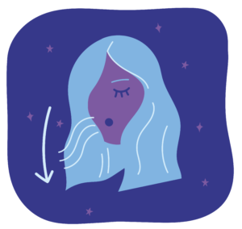Okay so you’re not sleeping well, feeling a bit out of sorts and grumpy, can’t quite focus on anything, can’t be bothered… and those sheep won’t jump the fence! Sleep deprivation is distressing and frustrating, and can cause us a lot of anxiety, but there are tools that can help.
This section is focused on good sleep hygiene. What is sleep hygiene?
Sleep hygiene are healthy sleep habits. Your behaviour throughout the day can impact on your sleep just as much as your bedtime routine. Food, drink, schedule, shifts – all impact on your sleep behaviours. We respond well to routines and good sleep hygiene is important for your mental, physical and emotional wellbeing.

10 tips for improving your sleep
Have a look at our 10 tips for good sleep hygiene and see if there is a way to build these into your daily life:
1. Consistency
Regular sleep patterns reinforce your body’s natural sleep rhythms. It also reduces the temptation to nap during the day. Try to schedule 6 – 8 hours of rest.

2. Bedtime routines
Try to have a bedtime routine, roughly 30 – 60 minutes before you go to bed. Your routine should include things that relax you, a warm bath, gentle stretches or yoga, meditation and mindfulness, focused breathing, reading or quiet music.
3. Electric Dreams
Try to avoid using any electronic devices, screens during or after your bedtime routine. Electronic devices tend to operate with a ‘blue’ light which can affect the production of melatonin, stimulate the brain and prevent you from falling asleep. If possible remove electronic devices from sleeping areas.
4. Jump up, jump about
Exercise, even as little as 30 minutes a day can improve sleep quality, particularly if it is outside as natural light helps to regulate sleep.
Avoid exercising less than 2 hours before bedtime, though, as it increases your energy levels, body temperature and feel-good endorphins which make it harder to fall asleep.
5. What’s your poison?
Caffeine is a stimulant and great for a mid morning booster, however the effects of caffeine can last anything between 3 and 7 hours. As with everything, the effects of caffeine are different for everyone, and the less you drink the more sensitive you are to its effects.
On the other hand, alcohol is a depressant, and while it may give the impression of helping you get to sleep initially, it significantly reduces the quality of your sleep, as it disrupts your cycle by reducing REM sleep. You can read more on why REM sleep is so important here.
6. What do you do in bed?
No, seriously what do you do? Your bed is a place that should really be used for sleep or sex, nothing else. This exclusivity strengthens the link in your brain between bed and sleep. If you use it as a place to chill out, eat, watch TV or study, your brain associates your bed with enjoyable or active activities; it needs to associate bed with sleep only.
7. Your space
Whatever your sleeping space looks like, make it work for you. What is most comfortable and relaxing? Consider temperature, light, noise, bedding, bedfellows (if they snore perhaps you need a separate sleep zone), electronic devices etc. Remove clutter if you’re able to. Remember, your bed is for sleep only, so try to extend this thinking to your whole sleeping space if possible.
8. Bedtime is for tired time
If you go to bed when you’re not tired, even if it is normally bedtime, you may end up becoming frustrated and angry. This is likely to keep you awake even longer. Go to bed when you feel tired. If after 20 minutes you are still awake, get up and do something relaxing: read a book, get a warm drink. Then go back to bed and try again.
9. Try to avoid napping
If you nap during the day, your sleep drive will be reduced and you may find it harder to get off to sleep. If you really need to nap, try to limit it to less than 30 minutes. You could also try 10 minutes stillness; find a quiet place to lie down, close your eyes and focus on keeping your body as still, but as relaxed as possible for 10 minutes.
10. Clear the decks
Before you go to bed, try and get rid of any stress or worry. See our worry pages for tips and hints. If you have stress or worry, this will become intrusive when you are trying to get to sleep or may wake you up in the night.
There are lots of good sleep apps to help you relax and drift off to sleep, try the links below. As with everything new this takes a bit of practice, but once you have the knack, your patience will pay off and you will be able to reap the benefits of a great night’s sleep.


